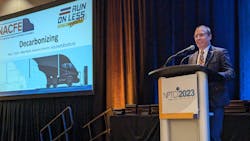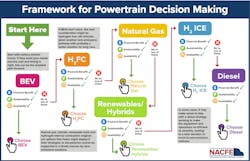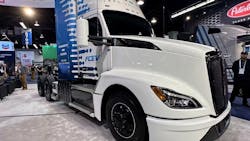ORLANDO, Florida—As regulators, the public, and corporations push decarbonization into transportation, more fleets are asked to look beyond the cost and time to move freight. With no single zero-emission solution for every duty cycle, the transition will be difficult, but it also creates opportunities for early adopters.
"We're living in an age where 10 years is a century of transitions," Gary Petty, the National Private Truck Council's president and chief executive, said during the opening general session of the trade organization's conference, which moved here to the Orange County Convention Center for the first time.
Petty was remarking on the keynote address on decarbonization by Michael Roeth, executive director of the North American Council for Freight Efficiency. Petty said his membership, including transportation leaders for some of the largest U.S. corporations, is primed to lead the way through this transformation.
"I think we all recognize that private fleets have a reputation in the trucking industry as being the pioneers and early adopters of new technology and products—and therefore, they represent a substantial growth market for these new powertrain options," he said.
Simple trucks for a complex future
See also: Managing expectations for a cleaner freight future
"You are the people who lean into these technologies and often early adopters," Roeth told a packed room of private fleet executives before laying out what his organization calls the "Messy Middle."
While long-haul trucks likely will rely on hydrogen fuel-cell technology or low-emission ICE powertrains, battery-electric trucks are much simpler than traditional equipment with internal combustion engines, Roeth said. And of all the future zero-emission power options, there are far more EVs in production than other alternatives.
"Trucks aren't simple, but these are the simplest of the trucks out there," he explained. "Batteries power electronic motors, you plug it in, and you go. There's no aftertreatment, no moving parts, etc. The big proponents of electric trucks will tell you there is zero maintenance and no moving parts. So they say, 'It's going to be unicorns and rainbows around moving freight.'
"Well, it's not—but it's a lot better than the modern diesel engines—that I loved all my career—but they've become awfully complex, difficult to operate, difficult to maintain," he said.
Roeth's organization, NACFE, is embarking on its fourth trucking efficiency study this year. The Run on Less series has focused on long-haul trucking, regional trucking, and early EV adoptions. This year's study will focus on fleets with at least 15 EVs running out of the same depot. Private fleets from PepsiCo and Frito-Lay (No. 2 on the FleetOwner 500: Top Private Fleets of 2023) are among the fleets participating in Run on Less: Electric Depot.
Electric trucks could have another benefit beyond decarbonization, according to Roeth: "I think battery-electric trucks are going to be the biggest driver attraction and retention technology that I'll see. It's just that they're simple to operate. They're fun to drive. They're easy to learn how to operate."
Trucking still faces challenges to electrifying, Roeth noted. There isn't enough charging infrastructure yet to power large fleets, for example. And more technicians need training on how to maintain EVs.
"They also have a lot of benefits that are difficult to monetize," he said. "Things like being able to take the truck through the main warehouse because there's no emission. And maybe getting rid of some exhaust equipment and some other things.
"So, I would ask you if you're looking at electric trucks, of course, you're going to do the financials and TCO and all that work," Roeth continued. "But keep in mind that they have some benefits that are difficult to monetize but that you want to be thinking about as you move through this journey."
Roeth suggested that fleets start looking at how they incorporate electric trucks over the next decade, such as short routes that return to base or yard tractors that stay in the depot and can be charged in brief spurts.
"If battery-electric trucks don't work for you, we suggest hydrogen fuel cells," Roeth added. "It's not available today, but it's coming. This might be at the latter part of this decade—if not in the 2030s—but hydrogen fuel-cell electric trucks will also get you in the game."
See also: EV opportunities are blooming in terminal yardsDecarbonizing long-haul has multiple paths
Paccar announced last week that it is taking orders for its hydrogen fuel-cell tractors from Kenworth and Peterbilt and plan to begin production in 2025.
"The regulations are driving so much faster adoption than anybody's comfortable with," Chuck Davis, sales director for PacLease, told FleetOwner on May 7. "The winners are going to be those that figure it out first. And there's not a single path. That's certainly what Paccar has found. So we're looking at all the fuels, all the avenues, to meet those zero-emission requirements."
Davis said that with all these fuel options, customers are turning to PacLease for electric truck rentals and leases to test the EV waters with OEM backing.
The other low-emission options for internal combustion engines: hydrogen, compressed natural gas, renewable natural gas, renewable diesel, and biodiesel.
See also: 2023 alternative-fuel engine outlook"So there's this group of technologies here in the middle that you might want to consider," Roeth suggested. "I know that for many of you, you've got mixed fleets where maybe you'll be able to go battery-electric trucks in part of the fleet, maybe use renewable natural gas for the longer haul parts of your market."
Roeth also stressed the importance of making current diesel equipment more efficient through aerodynamics, tires, and routing. "Saving fuel saves carbon, saves NOx, saves particulate matter," he said.
Roeth understands this industry transformation can be scary. "But I suggest leaning in and getting involved," he said. "Becoming a participant, not a spectator, via the suggestions we made is what's going to make us better as an industry."
Petty: Private fleet business never stronger
"The private fleet has never been stronger as a business model," Petty said during his open remarks at NPTC 2023. "The reason we know that is within the last 10 years, a number of companies that heretofore have never used anything but outside carriers for transportation solutions have started private fleets from scratch. It's a remarkable statement and affirmation of the private fleet as, arguably, one of the most successful components of corporate transportation."
Petty said private fleets proved their value during the COVID-19 pandemic by not only providing their companies with excellent customer service but also as a protection against potential risks and uncertainties of for-hire transportation.
"We can say with absolute certainty, based on our benchmarking reports, that private fleets are increasing the volume, miles, and number of shipments all by their own drivers they trust," Petty said. "Our benchmarking report shows that the majority of private fleets plan to add outbound and inbound freight to their in-house capacity. Over the next five years, the majority of private fleets will acquire more net drivers, add more net equipment, and accelerate their trade cycles in order to take advantage of the new technology."







